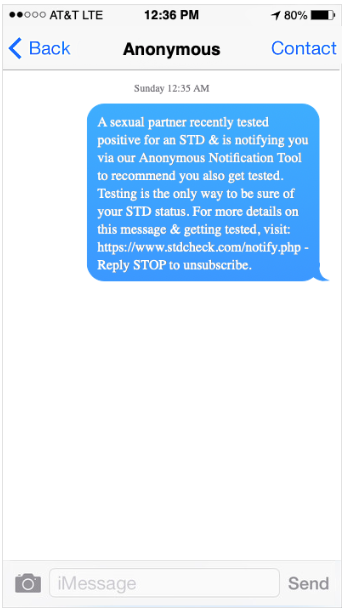 I recently had a patient come into the office for STI (sexually transmitted infection) testing because he had received an anonymous text message alerting him that he may have been exposed to an STI. The text was sent anonymously by one of his sexual partners through an STI notification service. While I was aware of such services, I had never seen a patient who had utilized this service or been on the receiving end of one of these messages.
I recently had a patient come into the office for STI (sexually transmitted infection) testing because he had received an anonymous text message alerting him that he may have been exposed to an STI. The text was sent anonymously by one of his sexual partners through an STI notification service. While I was aware of such services, I had never seen a patient who had utilized this service or been on the receiving end of one of these messages.
A simple google search revealed a long list of these types of sites. I fully support and encourage notifying your sexual partners about STI exposure, but this method led me to consider implications associated with anonymous notification.
One of the concerns I have is that people could use these sites to prank others and cause unnecessary anxiety and concern, not to mention unnecessary testing and medical costs. Further, some of the sites send a general message indicating that you have been exposed to an STI and need to be tested but do not specify which STI. For example, my patient received a statement that did not specify which STI with which he may have came into contact. For example, my patient received a statement that did not specify which STI with which he may have came into contact. As a result, this caused him a lot of anxiety and we found it necessary to perform a comprehensive STI panel, including tests for syphilis, tri-site screening (throat, rectal, urine) for gonorrhea and chlamydia, and HIV. Some sites do, however, specify the particular STI(s) to which you may have been exposed.
Is anonymous notification sending the wrong message about STIs?
Does it incite and further stigma surrounding sexually transmitted diseases? I believe so. I can tell you firsthand that stigma is one of the biggest obstacles I see in treating HIV but also applies to STIs.
At the end of the day, we are all adults here. If you are making decisions to have sex, you should feel comfortable talking about STIs because, well, that comes with the territory. I get that is easier said (or not said) than done. Telling a partner that you have an STI can be a rather embarrassing conversation for some. While I believe telling someone directly is the best practice, anonymous STI notification services may offer individuals another way to alert their partner(s). Regardless, I believe a person has a right to know what they were potentially exposed to and, ideally, who it came from. As the site www.dontspreadit.com points out, “You can tell the person face-to-face, over the phone, using our service, or any other creative way you may come up with. The important thing is that you tell them. Not enough people do.” I second that despite my concerns.
Informing your partner(s) is the responsible, right, and ethical thing to do. By notifying them, you are giving them the opportunity to get tested and treated, if necessary. Leaving an STI untreated can lead to medical complications like pelvic inflammatory disease, blindness, hearing loss, and even death. You are also potentially putting others at risk when this could have been avoided.
So regardless, if you are sexually active, you should be screened regularly. How often should you get screened for STIs? That heavily depends upon your sexual behavior. The general rule of thumb is every 3 months for those who are sexually active with more than one partner or not in an exclusive sexual relationship with one person.
What do you think about anonymous STI notification?
Jeremiah Robinson is a licensed and certified Physician Assistant at T. Douglas Gurley MD in Atlanta, GA.
